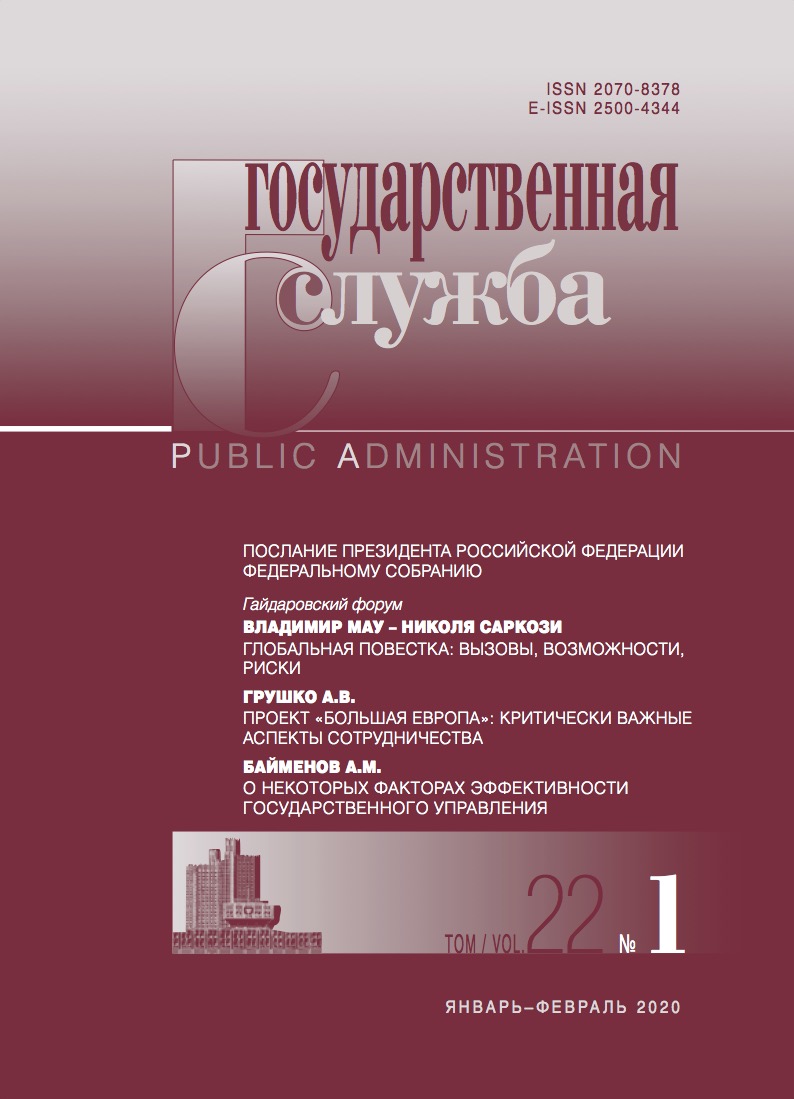Recommended link to article:
ALIKHAN М. BAIMENOVа
аAstana Civil Service Hub
DOI: 10.22394/2070-8378-2020-22-1-26-32
Abstract:
The article emphasizes that modern governments, working in unique socio-economic, historical and cultural conditions, must take into account global trends, as well as the growth of citizens’ expectations associated with the rapid development of information technologies and other factors. In such circumstances, special attention is paid to the effectiveness of public administration. The article discusses some of the significant factors impacting the effectiveness of public administration, such as the professionalization of the state apparatus, the legibility of the institutional framework, the optimization of information flows and corporate culture. In accordance with this, on the basis of work experience in the public administration system and analysis of civil service reforms in the countries of the region, the main challenges and possible solutions are shown. In the professionalization of the state apparatus, the importance of the merit principles in the selection and promotion stages of personnel through the empowerment of human resource (HR) management services, the integrity of tools and approaches at all stages of selection process, and the responsibility of the selection board are noted. The author focuses on the need to ensure a balance of powers, responsibility and resources, delimitation of powers between political and administrative civil servants, optimization of information flows. Particular importance is paid to corporate culture, which is one of the main factors affecting the efficiency of the state apparatus. It is noted that central values of corporate culture and leadership in state bodies of the countries of our region, along with generally accepted in the modern leadership theory, should be respect for the dignity, work and time of employees.
Keywords:
public administration, effectiveness, professional state apparatus, institutional framework, balance of the powers, responsibilities and resources, information flows, corporate culture
Received:
February 3, 2020
References:
Al-Farabi A. The Virtuous City. Almaty: International club of Abai. Series: My 100 books, 2015. In Kazakh
Baimenov A., Everest-Phillips M. A Shared Perspective on Public Administration and International Development. Public Administration Review. 2016. Vol. 76. Iss. 3. P. 389–390.
Baimenov A., Janenova S. The Emergence of a New Model? Trajectories of Civil Service Development in the Former Soviet Union (FSU) countries // In Public Service Excellence in the 21st Century / Edited by Baimenov A., Liverakos P. Palgrave, 2019. P. 105–143.
Balasaguni Y. Kutadgu Bilig / Translated from Old Turkic by A. Egeubai: 2nd Edition. Almaty: Region, 2006. 640 p. In Kazakh
DEAN. A Handbook for Political Appointees. How to effectively engage career executive to enable success. Senior Executives Association, 2016.
Levin P.T. The Swedish Model of Public Administration: Separation of Powers – The Swedish Style. JOAAG. 2009.Vol. 4. No. 1. Р. 38–46.
Mack O., Khare A., Kramer A., Burgartz T. Managing in a VUCA World. Springer, 2015.
Ugyel L. Relationship between politics and administration in Pacific island governmental systems. Devpolicy Blog from the Development Policy Centre. 2017: http://devpolicy.org
Voronov V.V. On the delimitation of powers between levels and authorities in the Russian Federation. Gosudarstvennaja sluzhba. 2019. No. 4. Р. 27–31. In Russian
Articles in Open Access mode are published under the Creative Commons Attribution 4.0 International (CC BY) license.

